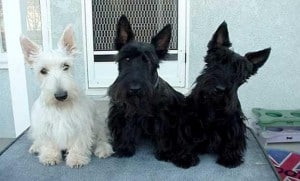From the Desk of Sharda Baker
Good day and welcome everyone!
Hello everyone!
This is Sharda again for another Scottish Terrier newsletter.
Today, let’s look at the Scottish Terrier Traits and what makes them a special breed.
This small, athletic and very intelligent dog is an enthusiastic companion and loyal friend.
The Scottish Terrier is known for its independence and self-confidence, but also for its protective nature towards its family and its territory.
Scotties tend to be rather determined dogs, and never seem to let their small size get in the way of accomplishments.
They are very rugged dogs, and enjoy a good play with older children and a romp with family members.
Many Scotties are used in trial competitions and other sporting event competitions, even those traditional entered by larger breeds.
The Scottish Terrier enjoys working, and does best when they have an activity to do such as fetching, obedience classes, or going for walks with the family.
The Scottie tends to bond very strongly with one or two people, but enjoys the company of many individuals.
Since the Scottie is more independent than some of the smaller breeds, it does not require constant attention, and can tolerate some time alone if given lots of love and attention when people are home.
TEMPERAMENT
Many people enjoy the intelligent look of the Scottie. They have very erect ears, and clear bright eyes that seem to watch everything that is going on.
They are great watchdogs and can be trained to stop barking once they have announced strangers approaching. Their deep bark is not an indication of their small size, and they are not afraid of animals or other dogs that are considerably larger than themselves.
Scotties tend to be very aware of their surroundings, and can learn to tolerate other animals such as cats and other dogs when socialized properly.
They do have natural terrier instincts so will often chase or dig, but with proper training and attention these behaviours can be minimized.
Scotties can be socialized to interact with even small children, but tend to do best with older children that understand how to correctly play with a dog.
Since they are terriers they may have a tendency to nip of teased or excited, and smaller children may not understand this behaviour.
TRAINING
As part of the terrier group the Scottie has the natural intelligence of a hunting dog. They are quickly able to learn new tasks and commands, and are very eager to please.
They require consistent and firm training, as their independent nature tends to make them a bit less compliant than some other breeds. They should never be punished harshly, and learn much faster on positive rewards rather than negative consequences.
Once a Scottie has learned a command they will respond appropriately.
Crate training is recommended for Scottish Terriers, both as a method of housebreaking and also as a “den area” for the Scottie to use. This gives the dog a safe place to go to calm down or relax when the family is not home or when they just need a break.
EXERCISE
They are a big dog in a small dog’s body, so they enjoy outings and runs. They generally love to play fetch and quickly develop favourite toys that they carry around with them. The Scottie will self-exercise if kept in an apartment or house, but will still require daily walks.
They are not a hyper or overactive dog, but do enjoy getting out and investigating their yard and neighbourhood. Scotties are prone to digging, part of their natural instinct, but frequent exercise and lots of toys to offer diversions can minimize the digging urge.
Scotties enjoy being with their families, and are usually good travellers. They can easily be trained to ride in the car, and with crate training can be taken on trains or airplanes with minimal problems.
Early training and socialization helps with this, and takes the fear or anxiety out of traveling.
HEALTH
Scottish Terriers are a very hardy and robust breed, and have few health conditions that cannot be treated.
As with all dogs a regular vaccination schedule and yearly check-ups are important, and any changes in behaviour or eating or drinking patterns should be followed up with a visit to the veterinarian.
CARE
Scotties have a thick inner coat covered by a wiry outer coat. The long hair of the outer coat does tangle and the inner coat will mat, so they do require daily brushing.
This is not a time consuming task, and Scotties quickly learn to look forward to their daily grooming session. Scotties usually can be dry powder cleaned rather than requiring a full bath.
They shed very little, and are a good breed for people that are allergic to dogs because of this.
If you are interested in an intelligent, sturdy and loyal companion then a Scottish Terrier may be dog for you. They require consistent training, love and affection and enjoy being with people as much as possible.
While needing a lot of attention at times, they can also tolerate a working family’s schedule provided they are given affection on a daily basis.
I hope you learned a lot from today’s Scottish Terrier Newsletter.
All the best and take care
Warmly,
Sharda Baker

